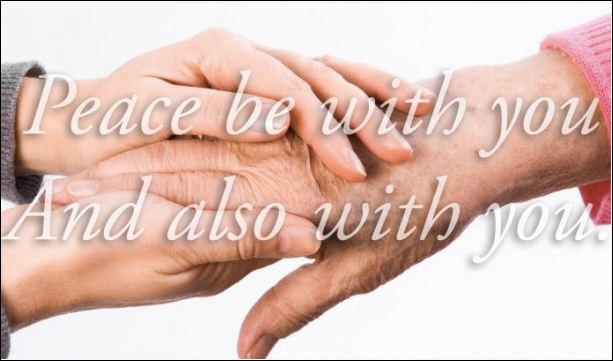
Many churches have a tradition of people in the congregation greeting each other. Some people shake hands and say hello, while others share the "peace of the Lord." What is this sharing of the peace? It is actually a custom that has been part of the service since Biblical times and has a specific purpose. It is not simply a friendly hello to your church family that you haven't seen for a week. It is also not a time for catching up or visiting, or even discussing church matters. Lastly it does not need to be extended to every other person in the worship service.
Sharing God’s peace with one another is an act of reconciliation that has its roots is in the words of Jesus Himself. In Jesus’ Sermon on the Mount, in Matthew 5:23-24, he says "So when you are offering your gift at the altar, if you remember that your brother or sister has something against you, leave your gift there before the altar and go; first be reconciled to you brother or sister, and then come and offer your gift". Likewise, Paul, in Ephesians 4:32 says to "Be kind and compassionate to one another, forgiving each other, just as in Christ God forgave you." In the Didache, an early Christian writing nearly as old as many of the New Testament writings, Christians are told to "come together on the Lord’s day, having first confessed your sins so that your sacrifice may be pure. Anyone who has a quarrel with his fellow should not gather with you until he has been reconciled, lest your sacrifice be profaned."
The tradition of sharing the peace was originally called the "kiss of peace," because people kissed each other when they exchanged the words, "The peace of the Lord be with you." The kiss of peace showed that the congregation was unified in faith. Basically, the idea is that you don't kiss and say something nice to someone with whom you're having a fight.
Some churches today "pass the peace" at the very beginning of the service, before the invocation so that they do not gather for worship without reconciliation. Some also feel that it is less disruptive to do it at the beginning, than in the middle of the service. In some places, the exchange of peace comes later in the service. Some do it right after the intercessory prayer and before the offering is gathered. This is to live out the prayers for peace that were just prayed as well as reconciling before, "offering your gift at the altar" as Jesus says in the Sermon on the Mount. Lastly, many do it right before the distribution of Holy Communion. This is because unity is required when communing. When you receive the body and blood of Jesus in the Lord's Supper, he unites you not only with himself, but with everyone else who has received it. People who greet each other with the peace of the Lord show that they recognize and welcome this unity.
Even if a church doesn't do it formally as part of the service, it is important to ask oneself as preparation for the service and the Lord's Supper, if there is anyone we are in conflict with and fix that broken relationship so that you can be united with your Lord and your brother or sister. Lastly, making peace is a continual action for us. We should not wait Sunday morning to make peace with our neighbors. Sharing God’s peace is a daily opportunity.
No comments:
Post a Comment